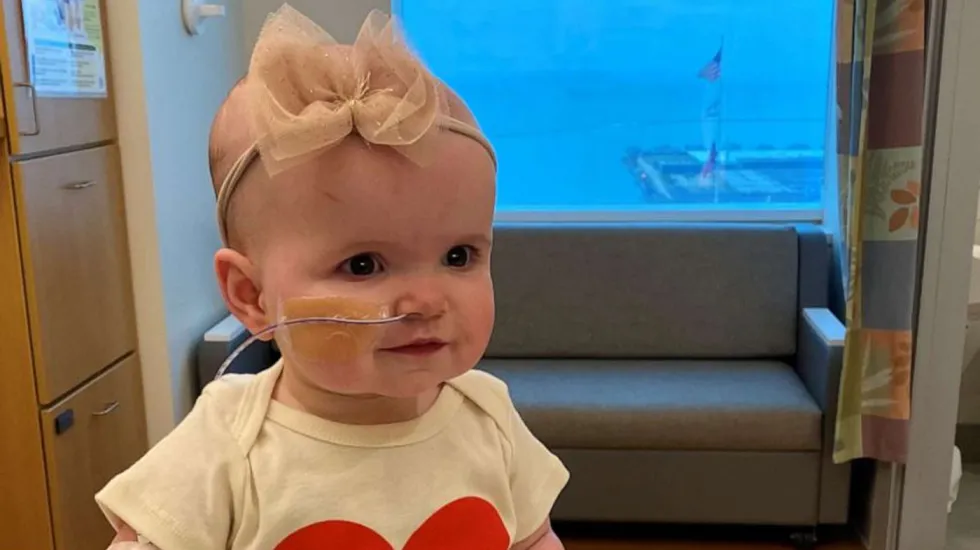
After waiting 218 days, 8-month-old Elodie Carmen Baker has a new heart.
Elodie was diagnosed with a rare heart disease when she was only about 2 months old. After a long wait for a matching donor organ to become available she underwent a successful heart transplant March 27 at The Heart Center at Lurie Children’s Hospital.
“The fortitude and the strength that she’s shown in the last seven months constantly amazes us,” Elodie’s mother Kate Baker said. “And we know that she’s destined to do remarkable things.”
“We’re just so proud of her,” said Collin Baker, the baby’s father. “Just [her] smile and the joy, just unwavering excitement for every single day — really, it’s inspirational.”
Dr. Anna Joong, one of Elodie’s doctors and the medical director of the pediatric ventricular assist device program at Lurie, said Elodie’s recovery “has been remarkable.
“She’s made incredible progress,” Joong said. “Her new heart works really well. The squeeze is really strong. She’s on all the routine medications that we do — like immunosuppression to prevent rejection. And we’re hoping that she will be able to be discharged from the hospital soon.”
The Bakers, who are from Minnesota, first took Elodie last August to the hospital in Minneapolis where she later was diagnosed with dilated cardiomyopathy.
After a seven-week stay at Children’s Minnesota Hospital-Minneapolis, she was transferred to Lurie, and the family lived at the hospital for nearly six months.
According to the American Heart Association, dilated cardiomyopathy leads to difficulty pumping blood and the heart muscle not contracting normally. As the heart gets weaker, heart failure can result.
As the Bakers waited for a new heart for Elodie, she underwent surgery to give her temporary help from what’s called a Berlin EXCOR pediatric ventricular assist device.
Some children with dilated cardiomyopathy see improvement over time. Others become sicker and need additional support, like IV medications or a device like the one Elodie was given, Joong said. Older kids sometimes go home with ventricular assist devices while waiting for a new heart. For infants, though, the pump can’t fit inside their tiny bodies.
“She had end-stage heart failure as a result of her dilated cardiomyopathy,” Joong said. ”We had exhausted all medical options to take care of her heart, and the only way for Elodie to survive was to get this kind of pump as a way to bridge her to transplant ... to keep her body strong enough in the many months that it took for a donor heart that was a match for Elodie [to] become available.”
The temporary help made it possible for Elodie to meet normal developmental milestones. Joong said the baby was in the “less than fifth percentile” in terms of normal development for an infant right after her ventricular assist device operation but went on to be “developmentally normal for an 8-month-old.”

“Despite being on these lifesaving machines,” Joong said, “we know that the stronger you are going into a heart transplant, the better you do afterward. And that was certainly the case for Elodie.”
Kate Baker said her baby girl “had her first open-heart surgery at 3 months old, which is when the VAD was placed.”
Still, she said Elodie “learned to sit, she was starting to crawl, she was starting to crawl to stand, and it was amazing that she was able to do all of those things while supported on this device.”
Elodie’s lengthy time waiting for a heart isn’t unusual.
Especially for younger kids, waits “can certainly be more than six months,” Joong said. “Right now, there’s over 50 infants [nationally] who are waiting for a heart transplant.
“It’s really the most incredible gift of life that a family can make in their darkest hours. And when you see a patient like Elodie and how well she is doing after this lifesaving surgery and this lifesaving gift, we are just forever grateful.”
Read more at USA Today.







